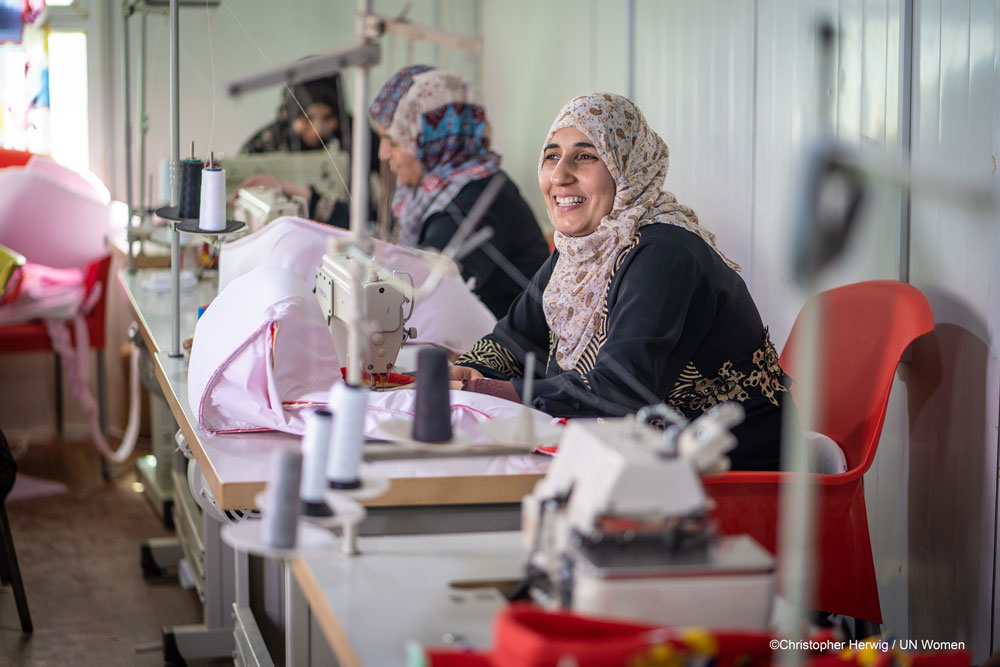
Using evidence to strengthen gender equality in fragile contexts

Context
Gender inequality is a global problem, and according to the 2022 Global Gender Gap report, the world would need 132 years to achieve gender parity. However, situations of fragility, conflict and violence tend to sharpen the gender gaps in resources, agency and achievements. The United Nations Security Council Resolution 1325 on Women, Peace and Security recognises the inordinate impact of violent conflict and war on women and girls, as well as the potential of gender equality and women’s empowerment in sustaining peace. Mapping the evidence on interventions building peaceful societies with support from the German Federal Ministry for Economic Cooperation and Development (BMZ), 3ie and the commissioners found a synthesis evidence gap around the effects of a range of gender-specific and gender-transformative interventions in fragile contexts.
To fill this synthesis evidence gap and help identify what approaches can improve women’s status in these settings, BMZ commissioned a new systematic review to synthesize the evidence on the effects of 14 different types of gender-sensitive and gender-transformative interventions. The systematic review included 104 unique studies covering 55 identified programmes and 32 linked impact evaluations papers, in addition to 90 linked qualitative and process evaluations. All these studies took place in 29 countries identified as being particularly fragile and having a high level of gender inequality.
Evidence
On average, all the identified interventions had positive effects on women’s empowerment outcomes closely related to the purpose of the intervention. No intervention had a significant negative effect on any outcome. Average effects were generally smaller, or negligible, for outcomes less aligned with the primary purpose or mechanism of the intervention. For example, none of the interventions had an effect on intimate partner violence. Some interventions were rarely studied – there is insufficient evidence to synthesise impacts for all-women police stations and community-based services. Many intervention-outcome combinations were not studied at all. The qualitative analysis of the 90 papers covering 55 unique programmes provided a rich complement to the quantitative findings by generating 149 descriptive themes across all studies and 37 analytical themes. The thematic synthesis emphasized that context is a critical aspect of implementation; from asset transfers to safe spaces interventions, programme participants cited gender and social norms as a significant barrier or opening factor for uptake.
Evidence impacts
Type of impact: Inform discussions of policies and programs
When subsequent phases of the evaluated programme or policy draw from the findings of the evaluation or review, and/or the study team participates in informing the design of a subsequent phase.
This is one of 3ie’s seven types of evidence use. Impact types are based on what we find in the monitoring data for an evaluation or review. Due to the nature of evidence-informed decision-making and action, 3ie looks for verifiable contributions that our evidence makes, not attribution.
Read our complete evidence impact typology and verification approach here.
Close windowCiting the review’s findings that existing development policy interventions have not adequately addressed prevailing social norms and gender roles, BMZ’s Feminist Development Policy (March 2023) called for evaluating and analyzing the ministry’s work to identify effective approaches for responding to the root causes of gender inequalities and discrimination. The policy document cited the review in a section titled Power to rethink: A Feminist Approach to German Development Policy Conclusions and Orientation of German Cooperation. The citation came after two successive issues of the BMZ’s Newsletter, Crisis Management in Practice, featured the systematic review. While the July 2022 issue touched upon review findings such as the importance of focusing interventions to family units rather than individuals and subsidizing transport and childcare for participation in vocational training, the March 2023 issue used the findings of the SR to develop recommendations for implementing partners to put into practice.
Suggested citation
3ie, 2023. Using evidence to strengthen gender equality in fragile contexts (online summary), Evidence Impact Summaries. New Delhi: International Initiative for Impact Evaluation (3ie).
Evidence impact summaries aim to demonstrate and encourage the use of evidence to inform programming and policymaking. These reflect the information available to 3ie at the time of posting. Since several factors influence policymaking, the summaries highlight contributions of evidence rather than endorsing a policy or decision or claiming that it can be attributed solely to evidence. If you have any suggestions or updates to improve this summary, please write to influence@3ieimpact.org